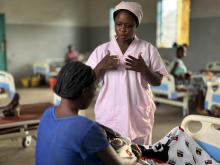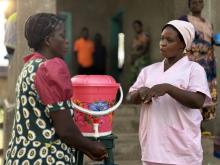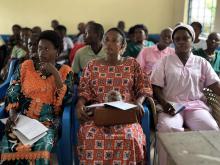Prevention as the first line of defence against Ebola
Bulape, Democratic Republic of the Congo—In Bulape locality in the Democratic Republic of the Congo’s Kasai Province, the first signs of the Ebola were detected in a local maternity ward. A pregnant woman arrived showing unusual symptoms: difficulty breathing and haemorrhage. Juliette, the midwife on duty at the time, assisted the woman through labour. While handling the needle used on the patient, she accidentally pricked herself. A few days later, she sadly passed away—along with the mother and newborn.
Antho, the head of the maternity ward, was also present. She helped with the patient’s care but followed simple safety steps that protected her from infection.
“Not only was I wearing gloves, but each time I touched the patient, I went out and washed my hands with soap and water,” she says, visibly emotional about losing her colleague. “It was hard to lose Juliette. We’d worked together for a long time, and even in the toughest moments, she supported the team. Her loss has left a big void.”
In public health emergencies, infection prevention and control is pivotal in saving lives. The ongoing Ebola response in the Democratic Republic of the Congo has focused on strengthening infection prevention along with other key outbreak control measures.
At the Bulape hospital as well as the maternity ward, infection prevention and control measures were reinforced. The measures included screening and triage at entry points, separate patient pathways to reduce risk, improved hand hygiene, safe injection practices, regular cleaning, availability of personal protective equipment and strict waste management procedures.
To make these changes sustainable, a committee on infection prevention and control was set up. Seventy-five hygienists, 32 nurses and 18 doctors received hands-on training in essential practices: triage, hand hygiene, safe injections, waste management, correct use of personal protective equipment, environmental hygiene and safe delivery.
The Ebola outbreak was declared on 4 September 2025 after 28 suspected cases and 15 deaths were reported, including four among health care workers. The country has since 19 October been counting down to declare the end of the outbreak. A total of 53 confirmed cases, 34 deaths, and 11 probable cases have been reported.
With better protection, health care personnel now work with confidence. Every day, Antho ensures that each birth is a moment of life, not a risk:
“Before, we worked out of habit. Now, we work with protection as a priority. I pass this message to every new colleague,” says Antho.
In the hospital courtyard, Etienne Makashi Pongo, who supervises sanitation and hygiene, provides constant support to his team.
“IPC (infection prevention and control) isn’t about making work harder. It’s about making sure we all go home healthy at the end of the day,” he says, emphasizing the impact of the practices on staff safety.
World Health Organization (WHO) has supported the efforts to strengthen infection prevention and control by assessing capacity in 16 health facilities across 10 of Bulape’s 21 health zones, developing improvement plans, and providing supervision and mentorship. The Organization also provided 200 pieces of personal protective equipment to health facilities, as well as 20 paediatric beds and mattresses. It also provided a safe water supply system and equipment to sustainably strengthen the maternity ward.
“Deliveries have resumed in a setting that ensures the safety of both patients and healthcare workers. Health workers are following standard precautions and working with great confidence. Patients are no longer afraid to come,” says Dr Justin-Marie Bongbango, acting head of infection prevention and control at WHO.
For Antho, the experience has served a crucial lesson.
“This experience taught me that to save others, you must first protect yourself.”
Communications Officer
WHO Regional Office for Africa
Email: dialloka [at] who.int (dialloka[at]who[dot]int)
Chargé de communication
OMS - République Centrafricaine
Email : ifonor [at] who.int (ifonor[at]who[dot]int)
Communications Officer
WHO DRC
Tel : +243 81 715 1697
Office : +47 241 39 027
Email: kabambie [at] who.int (kabambie[at]who[dot]int)







